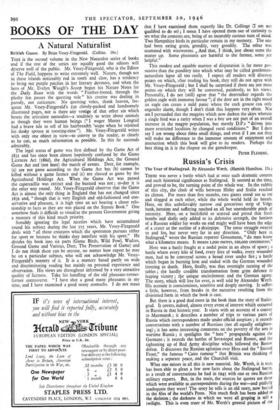Russia's Crisis
The Year of Stalingrad. By Alexander Werth. (Hamish Hamilton. 15s.) THERE was never a battle which had at once such dramatic content and such historical significance as Stalingrad. It seemed at the time, and proved to be, the turning point of the whole war. In the rubble of this city, the clash of wills between Hitler and Stalin reached its climax. For more than five months, two giants stood toe to toe and slogged at each other, while the whole world held its breath. Here, on this unbelievably narrow and precarious strip of Volga bank, heroism and suffering reached an all but unendurable- pitch of intensity. Here, on a battlefield so scarred and pitted that fresh bombs and shells only added to its defensive strength, the horizon of a Russian soldier for weeks on end might well have been the edge of a crater or the outline of a drainpipe. The tense struggle swayed to and fro, but never very far in any direction. " Only here in Stalingrad," wrote the Russian reporter Grossmann, "do men know what a kilometre means. It means x,000 metres, too,000 centimetres."
Here was a battle fought at a nodal point in an abyss of space ; a battle where every kilo of food, every litre of vodka, every wounded man, had to be conveyed across a broad river under fire ; a battle which began in burning heat and ended with the German wounded freezing to death. Here, finally, was that overnight turning of the tables ; the hardly credible transformation from grim defence to leaping victory • the unique encirclement and the German agony. The story, which will live for ever, is well told by Alexander Werth. His account is conscientious, sensitive and deeply moving. It suffers a little, however, from breaks in the narrative resulting from the disjointed form in which the book is cast.
But there is a good deal more in the book than the story of Stalin- grad. It covers, indeed, almost every event of interest which occurred in Russia in that historic year. It starts with an account of a convoy to Murmansk ; it describes a number of trips to various parts of Russia which correspondents made under official auspices ; it records conversations with a number of Russians (not all equally enlighten- ing) ; it has some interesting comments on the poverty of the arts in wartime Russia ; it spotlights the " hate " propaganda against the Germans ; it records the battles of Sevastopol and Rostov, and the tightening up of Red Army discipline which followed the Rostov defeat. It discusses the Russian agitation over Hess and the " Second Front," the famous " Cairo rumour " that Britain was thinking of making a separate peace, and the Churchill visit.
What one misses in all this is new material. Mr. Werth, it is true, has been able to glean, a few new facts about the Stalingrad battle, as a result of conversations he had in 1945 with one or two Russian military experts. But, in the main, the sources he quotes are those which were available to correspondents during the war—and pitifully inadequate they were! The story he tells is an old story, now buried in the files of the world's Press. Not much flesh has been added to the skeleton ; the darkness in which we were all groping is still twilight. This is even truer of Mr. Werth's general picture of the
Russian scene. The major controversies of the period are hardly illuminated at all ; the surface of events is hardly scratched. However, this is emphatically not Mr. Werth's fault. Though he came to his task with sympathy for the regime and a deep under- standing of the Russian people, as well as with the Russian language as his mother tongue, the facilities he enjoyed in Moscow were few and unexceptional. He has delved diligently into all the available material ; he has drawn on all possible sources of information. The fact that his marked ability and painstaking research have added so little to the sharpness of the picture is due simply to the curtain which hides so much of Russia from the world.
Werth himself, in his preface, puts the matter fairly. "This volume," he says, " though more shim a ' correspondent's book,' does not claim the august title of History. An ' authentic' history of the war in Russia . . . . is unlikely to be written for many years to come, if at all. To write a truly authentic history, one would require access to stenographic reports of, say, the Politburo, the Central Committee of the Communist Party, and of the most impor- tant of the military conferences, at which the vital decisions of military, internal and foreign policy were taken. Such reports are unlikely ever to be available." What Mr. Werth has done—and it is a valuable service—is to put into permanent and readable form a selection of contemporary records which might otherwise have been forgotten. I do not think that anyone could have done a



























 Previous page
Previous page